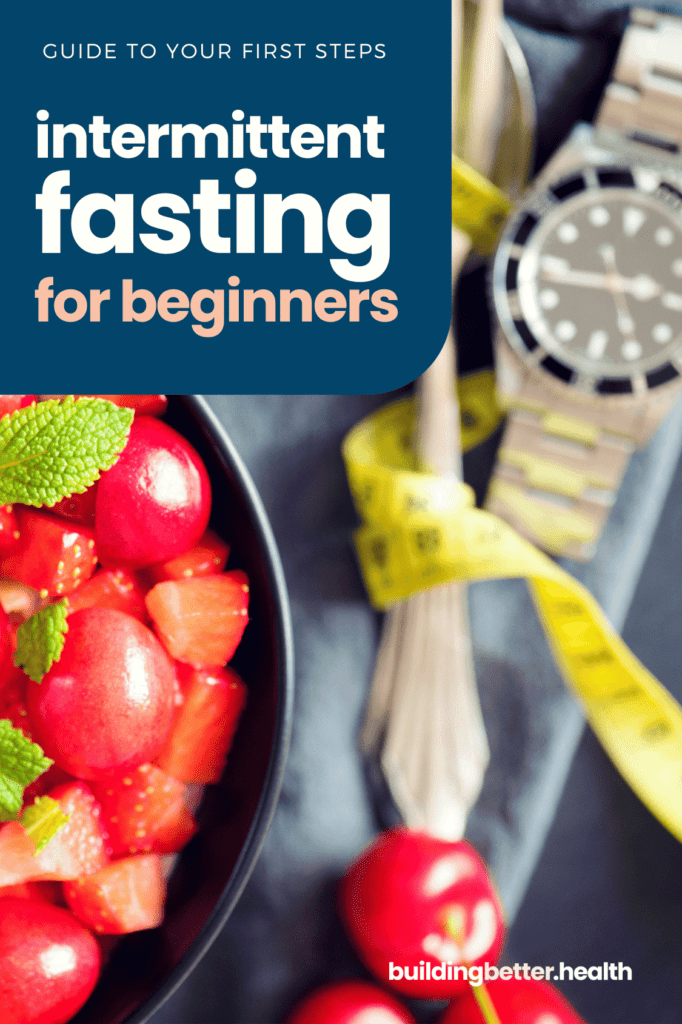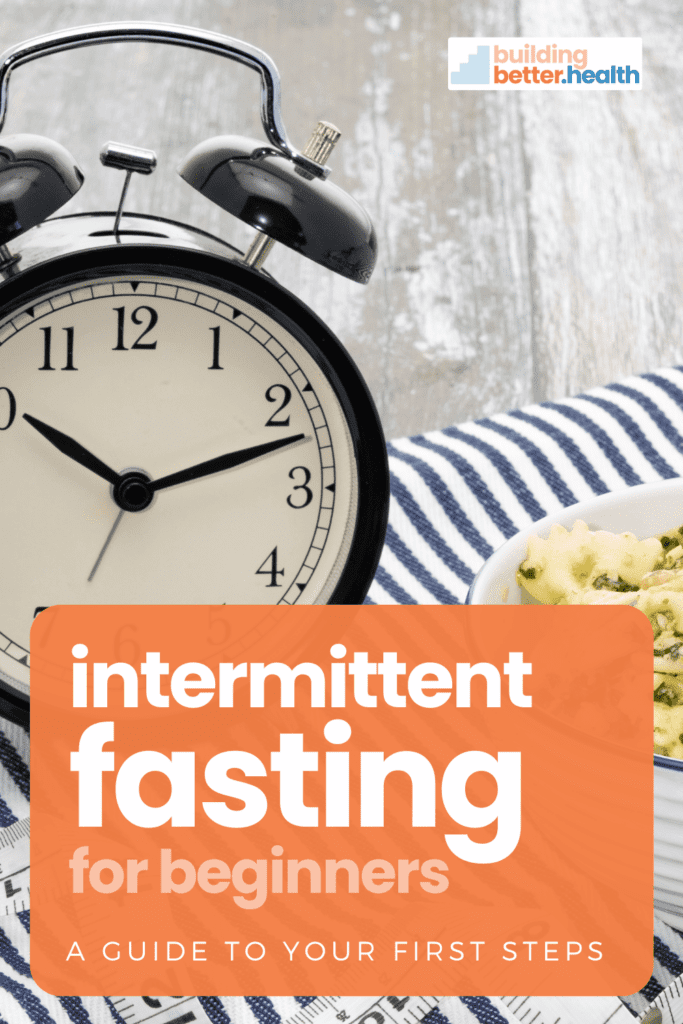
Please note: This website contains affiliate links. As an Amazon Associate, we earn from qualifying purchases at no additional cost to you.
Intermittent fasting (IF) is a growing trend in health and fitness. You’ve probably been inundated with fasting stories on social media, daytime talk shows, and podcasts, right?
It’s fascinating because fasting really isn’t a new diet trend, it’s honestly how people have been eating for hundreds of years! If you look back at the 1970s, most people ate three meals a day and they were done. No snacking on junk food throughout the day or late night refrigerator raids. They just finished dinner at 5 or 6 pm and didn’t eat again until breakfast. They were technically fasting for 12 to 14 hours.
By adopting this lifestyle, not only will it help with your weight, it can also improve brain, heart and gut health. If you ask anyone who’s been doing intermittent fasting for at least three months, they will most likely tell you that they feel amazing.
So if you’re new to intermittent fasting, this guide is for you. We want to help you start your journey to better health. Whether you want to lose weight, improve your metabolism, or just simplify your life, IF is a flexible and lasting solution.
Intermittent Fasting for Beginners Guide:
- The Basics of Intermittent Fasting
- Science-backed Evidence of Health Benefits
- Popular Methods: Intermittent Fasting for Beginners
- Getting Started: Your First Week
- Common Mistakes to Avoid
- Understanding Hunger and Cravings
- Safety Considerations
- When to Exercise
- Tracking Your Progress

Understanding the Basics of Intermittent Fasting
Intermittent fasting has become very popular for improving health and managing weight. It involves alternating between eating and fasting periods. This helps boost metabolism and offers many health benefits2.
What Happens in Your Body During Fasting
When you fast, your body makes some key changes. Your growth hormone levels go up, and insulin levels go down2. Cells start to repair themselves, including getting rid of damaged parts2.
These changes might help you live longer and prevent diseases2.
The Science Behind Time-Restricted Eating
Fasting can change your hormone levels, helping with weight loss. It also might make your metabolism faster for a short time2. Experts say it’s easier to stay healthy now because of lifestyle changes. This makes time-restricted eating a good option3.
Key Terms You Need to Know
It’s important to know the terms related to intermittent fasting. Autophagy is when cells recycle themselves, and insulin sensitivity improves with fasting2. Time-restricted eating means eating all your calories in a certain time3.
Learning about these changes and principles helps you see how intermittent fasting can help your health and weight goals.
Health Benefits and Scientific Evidence
Many studies show that intermittent fasting (IF) has health benefits4. It can help with obesity, diabetes, heart disease, cancers, and brain disorders4. There are different types of IF, like fasting every other day or eating only during a 6-hour window4.
Ketogenesis, a fasting state, boosts the body’s defenses against stress It helps remove damaged molecules from cells4. Repeated fasting can lead to lasting benefits, like better disease resistance and mental and physical performance4.
The 16:8 method involves an 8-hour eating window and a 16-hour fast. The 5:2 method includes eating normally for 5 days and then fasting for 2 days. Research shows IF and calorie restriction diets are equally effective for weight loss.
IF can also reduce insulin resistance, helping with weight loss and preventing type 2 diabetes. It might be more effective for blood sugar control in males than females. Additionally, it can lower triglycerides, which are linked to heart disease.
Animal studies suggest IF might increase diabetes risk in rats, but more research is needed for humans. Intermittent fasting may also help grow new nerve cells and reduce cancer risk by affecting insulin levels and inflammation.
IF leads to changes in hormone levels and insulin, promoting fat burning and muscle gain. It also triggers autophagy, a process that removes damaged proteins from cells. This may protect against cancer and Alzheimer’s disease.
| Intermittent Fasting Regimen | Description | Key Findings |
|---|---|---|
| 16:8 Method | 8-hour eating window, 16-hour fasting cycle | Equally effective for weight loss as calorie restriction diet5 |
| 5:2 Method | 5 days of standard healthy eating, 2 days of reduced caloric intake | Reduced insulin resistance, potential to prevent type 2 diabetes5 |
| Alternate Day Fasting | Fasting every other day | May increase risk of diabetes in animals, further research needed5 |
| Time-Restricted Feeding | Eating only during a specific time window (e.g., 6 hours) | Potential benefits for weight loss, heart health, and brain function5 |
“Intermittent fasting contributes to various changes in the body, including alterations in hormone levels, reduced insulin levels for fat burning, increased human growth hormone (HGH) levels for fat burning and muscle gain, cellular repair through autophagy, and changes in gene expression promoting disease protection and longevity.”
Popular Methods | Intermittent Fasting for Beginners
There are many popular intermittent fasting methods for beginners. Each offers different levels of flexibility and intensity. This lets you pick a plan that fits your lifestyle and goals.
The 16/8 Method Explained
The 16/8 method is simple. You fast for 16 hours and eat within an 8-hour window. It’s easy to stick to because it’s similar to regular eating times.
The 5:2 Diet Approach
The 5:2 diet is another favorite. You eat normally for 5 days and limit calories to 500-600 on the other 2 days. Its flexibility makes it easier to follow.
Eat-Stop-Eat Method
The Eat-Stop-Eat method means fasting for 24 hours, once or twice a week6. It offers big health benefits but might be tough for beginners.
For beginners, the 16/8 method is a good start. Start with a 12-hour fast and gradually increase it.
Remember, results can vary with these methods. Talking to a healthcare professional can help find the best plan for you.
Choose a method that you can stick to and fits your healthy lifestyle7. By trying different approaches, you can enjoy the benefits of intermittent fasting67.
Getting Started: Your First Week of Fasting
We won’t sugar-coat this. The first week can be tough. But with some prep and patience, you can make it work. The standard approach for intermittent fasting (IF) is 8 hours of eating and 16 hours of fasting. This gives your body a break from digestion.
To start, try a 12-hour fast, mostly during sleep. This helps your body adjust slowly as you how to start intermittent fasting. You can then gradually move to 16 hours of fasting, picking a schedule that fits your life well. Drinking water helps prevent hunger headaches and keeps you energized.
At first, you might feel hungry and weak as your body gets used to it. Drinking coconut MCT oil or keto coffee during fasting can help with insulin control8. Using fatty fast hacks like butterball coffee can keep you energized and focused.
As you keep going, watch how your body reacts and adjust your fasting times if needed. Remember, what you eat during your eating times is key for health benefits. Studies show people lost 1% to 8% of their weight through intermittent fasting.
Common Mistakes to Avoid When Starting Intermittent Fasting
Starting intermittent fasting can change your life, but there are a few common mistakes beginners (and sometimes seasoned pros!) can make.
1. Over-complicating your schedule
Begin with a 12 to14 hour fast and slowly increase it as you get used to it. Don’t try extreme fasts right away. They’re hard to keep up and can make you feel burnt out.
Many beginners have had success and saw positive health benefits just by fasting for 12 to 14 hours for several months! Don’t be too hard on yourself and just increase your fasting time when you and your body are ready.
2. Incorrectly breaking your fast
After a fast, most professionals don’t recommend eating an enormous meal. It could mess up your digestion and lessen the fasting benefits11. Instead, start with small to medium-sized meal that is high in protein, fiber and fat (PFF).
Simple example: Scrambled eggs made with cottage cheese, spinach and an avocado.
3. Staying hydrated during fasting periods
Do not let yourself get dehydrated while you are fasting! Drinking about 2 liters (64 ounces) of water a day helps avoid mistaking thirst for hunger. Drink water, herbal tea, or black coffee to stay hydrated and full of energy during fasting times.
Avoid these mistakes and stick to a simple, doable plan for fasting. Listen to your body, adjust your fasting schedule as needed, and focus on healthy eating habits that fit your lifestyle.
“Start slow and listen to your body when trying intermittent fasting. The benefits are mixed, so find what works best for you.”
| Mistake | Recommendation |
|---|---|
| Overcomplicating your schedule | Start with a 12-14 hour fasting window and gradually increase as needed |
| Breaking your fast incorrectly | Ease back into eating with light, nutrient-dense foods (high in protein, fiber, fat) |
| Not staying hydrated | Aim for 2 liters (64 ounces) of water, herbal tea, or black coffee per day |
By following these tips and avoiding common pitfalls, you’ll be well on your way to a successful and sustainable intermittent fasting journey. Remember, the key is to find a fasting schedule and healthy eating habits that work best for your individual needs and lifestyle.
What to Eat During Your Eating Windows
Healthy eating habits and meal timing are key when you’re fasting. Eat nutrient-dense, whole foods to nourish your body and keep you full.
Make lean proteins like chicken, fish, and legumes a big part of your diet. Healthy fats from avocados, nuts, and olive oil also help you feel full and support health. Complex carbs like whole grains, sweet potatoes, and quinoa give you energy and nutrients.
Eat lots of fruits and vegetables for fiber, vitamins, and minerals. Berries can help you keep a healthy weight. Eggs are also great for protein, keeping you full longer.
| Food | Benefits |
|---|---|
| Lean Proteins (Chicken, Fish, Legumes) | Promote satiety and muscle growth |
| Healthy Fats (Avocado, Nuts, Olive Oil) | Support overall health and keep you feeling full |
| Complex Carbohydrates (Whole Grains, Sweet Potatoes, Quinoa) | Provide sustained energy and essential nutrients |
| Fruits and Vegetables | Rich in fiber, vitamins, and minerals; berries linked to smaller BMI increases |
| Eggs | High in protein, helping to keep you feeling full |
Stay away from processed foods and too much sugar. They can harm the benefits of fasting13. Plan your meals well to get all the nutrients you need. Start with foods that are easy to digest13.

While fasting focuses on when you eat, what you eat is also very important. It affects your health and weight management13.
Understanding Hunger and Managing Cravings
Starting a weight loss or calorie restriction journey can be tough. You might feel hungry or crave certain foods a lot. It’s key to know the difference between feeling hungry and craving food for other reasons. This helps you find ways to handle these feelings better.
Physical vs. Psychological Hunger
Physical hunger grows slowly and can be filled with any food. But, psychological hunger is quick, specific, and often linked to emotions or surroundings, not hunger itself.14 Knowing the difference helps you stay focused and reach your goals.
Strategies for Dealing with Cravings
Here are some ways to deal with cravings:
- Drink at least 2.5 liters (85 ounces) of water daily to reduce cravings
- Do something else, like play Tetris for 3 minutes, to distract yourself from cravings
- Get 7-9 hours of sleep each night to help with fasting and hunger control
- Manage stress well, as it can make you hungrier and crave more
- Eat mindfully to enjoy your food more and avoid eating too much
- Slowly increase your fasting times to let your body adjust, being patient is important
Hunger comes and goes, and it might go away if you wait. By knowing the difference between hunger and cravings, and using good strategies, you can handle cravings well. This keeps you on track with your weight loss or calorie goals.
For specific advice on intermittent fasting, talk to health experts or dietitians. This is especially true if you have health issues or concerns.
How Intermittent Fasting Affects Your Metabolism
Intermittent fasting (IF) can change your metabolism in big ways. It can boost human growth hormone (HGH) levels and improve insulin sensitivity. It also makes it easier for your body to use stored fat for energy16. But, it’s key to know how IF works to use it right for your health and weight goals.
Short-term fasting can make your metabolism jump up by 14% because of norepinephrine. This hormone helps burn fat16. Your body naturally increases metabolism to adapt to fasting and keep energy. Some studies say IF might help keep muscle mass while losing weight better than diets that cut calories16.
But, long fasting can slow down your metabolism a bit. This shows why eating right during your eating times and adjusting fasting is important16. The goal is to manage weight and stay healthy, as all diets are hard to keep up long term17.
Overall, IF can boost metabolism, especially short-term, by burning fat and keeping muscle1717. But, it’s crucial to work with a doctor to make a plan that fits you. This ensures you can keep up with your weight goals for the long haul.
| Intermittent Fasting Effect | Timeframe | Impact on Metabolism |
|---|---|---|
| Short-term fasting | Up to 14 days | Temporary increase of up to 14% |
| Prolonged calorie restriction | Weeks to months | Slight decrease in metabolic rate |
| Increased fat-burning | At least 12 hours of fasting | Transition from burning glucose to burning fat for energy |
| Muscle mass preservation | Compared to traditional diets | More effective at retaining lean muscle during weight loss |
In conclusion, intermittent fasting can be a great way to boost metabolism and lose fat. But, it’s important to do it in a balanced and sustainable way. By understanding how IF affects your body, you can make the most of it and reach your health and weight goals safely and effectively.
Safety Considerations and Who Should Not Fast
Intermittent fasting (IF) can be great for health, but it’s not for everyone. People with certain health issues or personal situations should be careful. They should talk to their doctors before starting18.
Medical Conditions to Consider
Those with diabetes, blood sugar problems, or eating disorders need to be extra careful with IF18. Pregnant or breastfeeding women, and those trying to get pregnant, should avoid fasting. It could be risky for their health and the baby18.
Warning Signs to Watch For
When fasting, watch for signs like constant tiredness, dizziness, or other odd symptoms. If you notice these, stop fasting right away and see a doctor18. Also, look out for signs of eating disorders, too much weight loss, or missing periods in women. These could mean you need to change or stop your fasting plan18.
Listening to your body and focusing on your health is key to safe fasting. Knowing the risks and taking a careful, personal approach helps you enjoy fasting’s benefits without harm..
“The benefits of intermittent fasting are still a subject of debate in the scientific community.”
Combining Exercise with Intermittent Fasting
Adding exercise to your intermittent fasting (IF) routine can boost weight loss tips and metabolism boosting. But, it’s key to listen to your body and adjust as needed. Some like to exercise during fasting, hoping to burn more fat. Others find they do better when they eat first.
Start with light activities like walking or yoga during fasting. As you get used to it, you can make your workouts harder. Make sure to eat enough protein during your eating times to keep muscles strong.
Drinking water is vital during fasting, especially when you’re active. Coconut water can help with electrolytes. If you feel weak or dizzy, try a drink with carbs and electrolytes, then eat a balanced meal.
“Timing your workouts during your eating periods is advised for peak nutrition levels, especially important after heavy lifting for muscle regeneration.”
Always talk to a healthcare provider before starting fasting or exercise. Paying attention to your body and adjusting will help you find the right mix for your goals.

Tracking Progress and Adjusting Your Approach
As you begin your intermittent fasting journey, it’s key to track your progress and adjust as needed. Apps like Zero or MyFitnessPal can help you keep an eye on your fasting times and what you eat. They can potentially spot patterns and help you make smart changes to your fasting plan.
When setting goals, aim for overall health gains, not just weight loss. But, keep your expectations realistic. Watch your energy, sleep, and overall health to see if your fasting is working well.
You’ve got this!
If you liked this article about intermittent fasting for beginners, please pin and share!

Please note: This website contains affiliate links. As an Amazon Associate, we earn from qualifying purchases at no additional cost to you.










